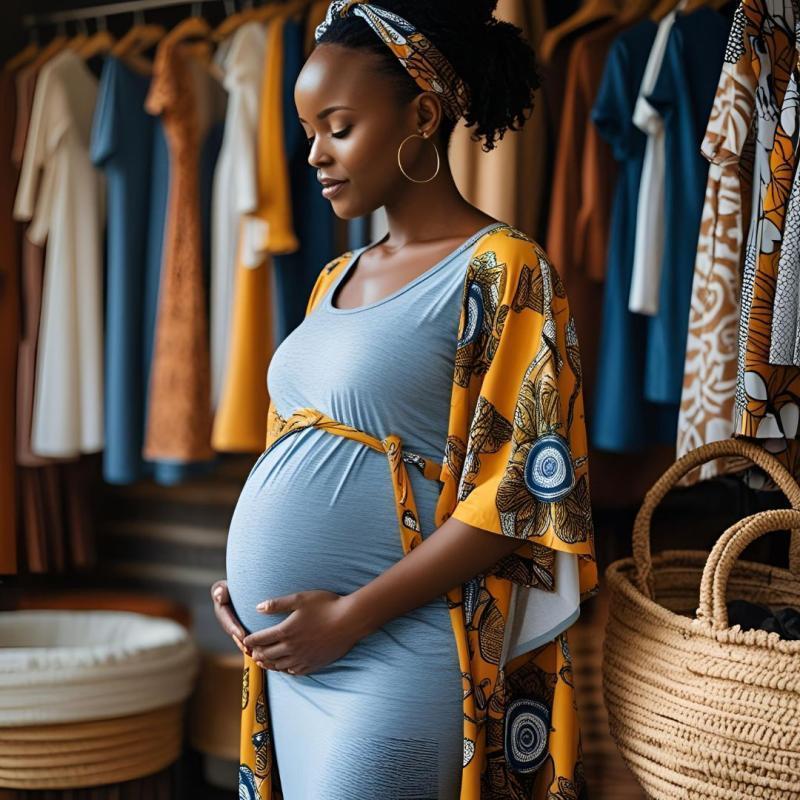Tinovonga Dhlamini identified a market gap and built Fabulous 9, a stylish maternity wear business in Zimbabwe. Learn about her journey from university student to entrepreneur, overcoming challenges, and creating a one-stop shop for expecting mothers with quality, affordable maternity clothing and baby essentials
Who said expecting women cannot look stylish and chic? There is absolutely no reason pregnant women cannot dress well. It is for this reason that Fabulous 9 was formed, with an intention of giving women a memorable nine months of their pregnancy and beyond. The company provides comfortable and stylish apparel for expecting mothers, along with maternity and feeding accessories. Recently, they expanded their offerings to include baby clothes - from newborn sizes up to one-year-olds.
The business idea struck Tinovonga Glenda Dhlamini when she was just 22 years old, during her second year studying Computer Science and Statistics at the University of Zimbabwe. She noticed a gap in the market while helping her brother's wife shop for maternity wear in Harare. Their shopping experience proved disappointing as they failed to find maternity clothes that met the needs of a young expecting mother. The available options were drab, lacking the appeal and style they sought. In that moment, Tinovonga realized a potential business opportunity - to provide stylish, comfortable, high-quality clothes for pregnant women.
After graduation, when she secured her first job, Tinovonga felt strongly that it was time to put her idea into action. Stepping out and believing in her concept wasn't easy. "It bothered me that I was not the first woman to have such an idea, but how come nobody had implemented it? There was so much competition in the clothing industry from shoes to baby wear and yet nobody had taken up this particular sector, I wondered why," she said. Applying her statistical knowledge, Tinovonga conducted market research to determine if there was demand for maternity wear. She distributed questionnaires to women in her circle to learn where they shopped for maternity clothes and whether they were satisfied with available options. Her study revealed women were dissatisfied with local offerings and relied on relatives in countries like South Africa, United States, and United Kingdom to send them maternity wear.
With these findings, Tinovonga researched what made good maternity outfits and approached two local tailors with her business proposal. After reaching an agreement, she created a catalogue with designs for customers to choose from. Initially, her business operated on a product-on-demand basis. Customers would make a down payment when ordering, which she used to purchase fabrics and accessories for production. Her business grew organically through word of mouth and referrals. After a year of operation, she began building an inventory of ready-made clothes.
As the business expanded, Tinovonga formalized it and established proper premises. She partnered with her cousin, and together they registered the business in 2010. To broaden their offerings, they reached agreements with manufacturers of maternity and feeding accessories like Carriwell and Medela to supply items such as feeding bottles, nursing bras, and breast pads. They also conducted research at Harare's top three maternity homes to determine the characteristics of women giving birth each month for business projections.
After formalizing the business, Tinovonga discovered that running it wasn't as straightforward as anticipated. Since they focused solely on pregnant mothers, their products were viewed as luxuries in an economy where US dollars were scarce. Mothers prioritized baby preparations over maternity clothes. Additionally, maternity wear is only needed for a short period during pregnancy until the woman becomes pregnant again. Another challenge was local consumers' preference for shopping in South Africa. The business struggled until they decided to close after five years of operation. "Now that we were out there, I realized there were a lot of things I didn't know about business. The United States dollar had become elusive at that time, I saw that it was best to close shop and re-think our strategy," she explained.
In 2016, Tinovonga enrolled in the MBA program at the University of Zimbabwe. The program gave her fresh insights for problem-solving and new perspectives on making her products more appealing. In 2019, she reopened Fabulous 9, this time operating alone as her cousin had moved on to other interests. Tinovonga was now prepared for the pitfalls they'd encountered previously. She had developed a clearer vision: to grow Fabulous 9 to the scale of Baby City, with presence in all major Zimbabwean cities. The company expanded to include baby wear and essentials, positioning Fabulous 9 as a one-stop shop for expecting mothers.
The company holds an advantage over South African retailers by understanding local market needs and aiming to exceed customer expectations. Moreover, they control the entire value chain in maternity apparel production and source accessories directly from manufacturers, making their products more affordable compared to competitors. During the COVID-19 pandemic, lockdown measures actually boosted sales by forcing buyers to seek products locally.
Tinovonga is grateful for her mother's support since her father passed away during her high school years. She draws inspiration from Mr. Mataranyika, founder of the Nyaradzo Group, admiring how he transformed a simple business model into something remarkable by meeting local market expectations. She's also influenced by Dr. Myles Munroe's books and believes fear can prevent people from fulfilling their God-given potential. Tinovonga encourages young entrepreneurs not to fear pursuing their business ideas despite challenges. "A real vision will be tested to prove its authenticity, so do not give up," she advises.




